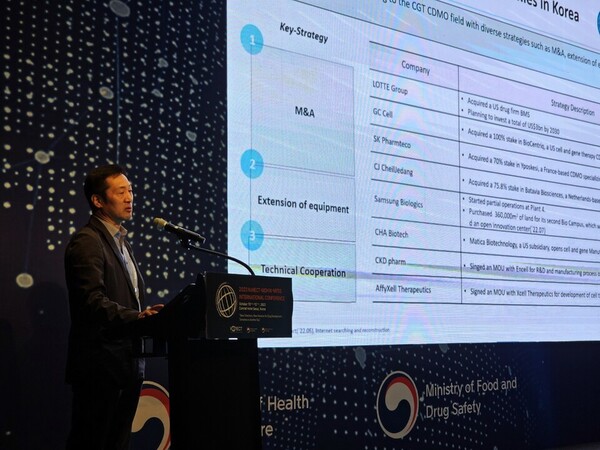
With the growth of the cell-gene therapy (CGT) market, the contract development and manufacturing organization (CDMO) business targeting such treatments is also growing.
However, industry executives express concern about a “mismatch” between domestic CDMOs and CGT developers.
Last Wednesday, Ahn Jong-seong, head of Production and Quality Headquarters at Kolon Biotech, delivered a presentation, “CDMO Outsourcing Trends and Benefit,” at the 2023 KoNECT International Conference (KIC) held at the Conrad Hotel in Yeouido, Seoul.
Ahn has been involved in developing vaccines, cellular therapeutics, and cytogenetic therapeutics at the GC Group, including GC, Mokam Life Science Research Institute, GC LabCell (now G-Cell), and GC Cell. He has been the head of the Production and Quality Headquarters at Kolon Biotech since 2022.
According to data from Ahn, the global CGT CDMO market is expected to grow from about $2 billion (2.71 trillion) in 2020 to $10.1 billion by 2026.
"It's no secret that the biopharmaceutical market is growing, and CGT, or advanced therapeutic medical products (ATMPs), is one of the fastest-growing segments," Ahn said. “For example, CAR-T therapies cost about 300 million won ($221,519) to 500 million won per unit, so the number of companies developing them has increased dramatically. More than 100 companies or organizations in Korea are developing CAR-T therapies."
The CGT CDMO industry is still in its infancy as there are not many licensed drugs worldwide, and the CMC (chemical synthesis, manufacturing process, and quality control) is not standardized. Therefore, companies with their own CGT products are expanding their business by expanding production facilities and producing products for companies that require contract manufacturing, Ahn explained.
He noted that the lack of CGT production technology for companies in the early stages of development and the cost savings for developers is another reason for CGT CDMOs. "It's challenging to have all the GMP facilities at the beginning of development, so we outsource a lot in the early stages of development, such as nonclinical and phase I clinical trials," Ahn explained.
In Korea, Lotte Biologics, Samsung Biologics, GC Cells, SK pharmteco, CJ, Cha Biotech, Chong Kun Dang, and Daewoong Pharm's joint venture Affyxell Therapeutics have entered or announced their entry into the CDMO market for cytogenetic therapies. Large companies and smaller conventional pharmaceutical companies are eyeing the market.
However, the future is not all rosy for companies. Ahn pointed out that there are some mismatches when it comes to what domestic CGT developers consider when choosing a CDMO.
Early-stage developers have a high demand for consulting, so they choose domestic companies that are close and easy to communicate with. They don't need a lot of clinical samples, so they use companies that don't have extensive manufacturing facilities. However, as the development stage gradually enters the later stages, he explained they start to look for global companies one after another.
"In our survey, most responded positively when we asked about using one CDMO from early to late-stage clinical development. However, the problem lies with their scale," he said. "It's risky for developers to change CDMOs later on. It is necessary to consider the possibility of scaling up from the beginning and discuss whether they have sufficient capacity with each other.”
Strict GMP compliance is also one of the capabilities required of domestic CDMOs.
"Production facilities need not be large for autologous cell therapies, but GMP compliance is important. For instance, you may produce only one item. However, if you produce 10,000 units annually, it is the same as making 10,000 different items," Ahn said.
Ahn pointed to four factors to consider when selecting a CGT CDMO: the development stage of the drug, the range of services, transparency on costs, and speed and quality.
He stressed that there should be smooth communication between the CGT developer and the CDMO.
There are many cases where companies request services without knowing the level of their development stage. A company claims to have developed a process in quite a few cases. Still, according to Ahn, it is not appropriate for non-clinical use. Therefore, the scope of the service is essential. He added that both parties need to communicate the extent to which they will provide services.
"In the case of CGT, the manufacturing regulations are not clear, so the production itself has to be done with science in mind,” Ahn said. “In CGT, the manufacturing process is so important that some people even say that the process is the product. Therefore, how to optimize this part is becoming a competitive advantage."

